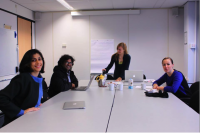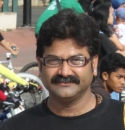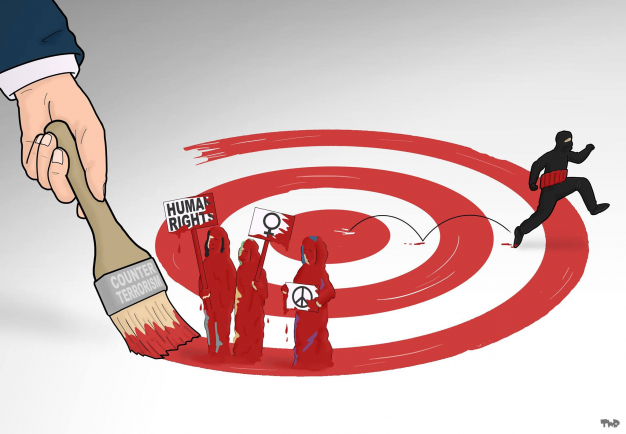To highlight the great work of SANAM, WPP volunteer Laura Eggens interviewed Anand Pawar about the work of SANAM, the added value of working with a masculinities perspective to advance gender equality and his personal motivation of doing this work.  On December 6, the Women Peacemakers Program (WPP) met with two delegates from SANAM (South Asian Network to Address Masculinities), Maria Rashid Zaidi and Anand Pawar, for a strategy meeting in The Hague, the Netherlands. WPP has a long history of working with individual members of SANAM, both as trainers as trainees in several WPP Training of Trainers Cycles. Given the shared analysis of WPP and SANAM of the necessity to include a critical masculinities perspective for the advancement of the Women, Peace and Security agenda, both organizations took the opportunity of looking into further structural collaboration between the two organizations.
On December 6, the Women Peacemakers Program (WPP) met with two delegates from SANAM (South Asian Network to Address Masculinities), Maria Rashid Zaidi and Anand Pawar, for a strategy meeting in The Hague, the Netherlands. WPP has a long history of working with individual members of SANAM, both as trainers as trainees in several WPP Training of Trainers Cycles. Given the shared analysis of WPP and SANAM of the necessity to include a critical masculinities perspective for the advancement of the Women, Peace and Security agenda, both organizations took the opportunity of looking into further structural collaboration between the two organizations.
“I first became exposed to discrimination as I migrated to the city for my studies. I saw the many different bases for discrimination and opened my eyes to how larger structures of gender, discrimination, violence and exclusion are all connected. These intersectionalities between different structures play an important role in my work on gender and masculinities. Many reproductive health programs that work with men, including the one I worked for in my first job, focus only on symbolic transformations of men’s behavior. They make men wear condoms, without thinking about how wearing condoms would challenge patriarchy or the ideas of manhood. As I worked with women’s groups I started realizing the complex nature of the intersections of patriarchy with caste, religion or culture, for instance.
Many of these programs were based on a weak analysis of power relations between genders and their association to other aspects of life. We run the risk, if our interventions are superficial, of teaching men the politically correct language of equality without any actual personal or institutional change. To give an example, people often don’t understand what the relationship is between being a caring father and having hatred towards Pakistan. But you cannot be a sensitive man, hating a nation. You cannot stop domestic violence in the domestic sphere, while the culture of violence and hatred is all around.
I started meeting many like-minded people in India and South Asia, who took a similar critical position on existing work with men. In 2010, we formally set up SANAM as a very loose network of activists who want to talk about the politics of masculinity, and not just about “working with men”. SANAM provided this framework of analyzing day-to-day realities and structures from the lens of masculinities.
In this light, the fellowship program that SANAM organized actually changed the discourse on how masculinities need to be “taught”. It does not just look at masculinities, contextualized to South Asia, but examines the intersections with patriarchy, politics, religion, conflict, culture, violence, globalization, development, and many other domains. SANAM fellows went on to research masculinities in relation to all these different domains, by focusing on dance and masculinities, or on bullock cart racing and how it creates meaning of being a man in a particular society. The work of the fellows really helped to expand the canvas on the way masculinities work in particular societies, cultures and times.
I use SANAM’s critical analysis in my own gender trainings and in SAMYAK’s programs. In SAMYAK, we decided not to work with easy-to-access groups of working class men. When it comes to violence against women, we need to work with upper class men, because patriarchy is mixed with the hegemonies of caste. In our program Youth for Equal Society (YES) we worked with young college men who were hanging around the college parking lots or canteens, making a nuisance and making sexually colored comments towards girls. I was part of those groups myself during my graduate course, so I always realized that those had great potential and a lot of energy when you help them transform their ideas.
These young men were not directly interested in attending gender and masculinities trainings, so we invited them to learn graphic design. We asked them to design a poster for various college campuses, on masculinities. But to design posters on masculinity, you need to understand the topic. They agreed to be part of a workshop where they reflected on all the risks they take as men. This is something that most HIV programs that work with men don’t do: they talk only about health risks, while this young man is taking risk in all other aspects of life. These young men talked about speeding, smoking, jumping in the floodwater, climbing tall trees, seeking attention. The posters they made, reflecting on the consequences of risk, included the message that it is okay not to take risk. You’re still a man if you don’t. The program had quite an impact on the young men. One of them even went on to do Women’s Studies in one of the premier institutes in India.
One of the key lessons I learnt from this program was that we need to make discussions around gender and masculinities non-threatening to men. Transformations take time, and at their own pace men will be happy and comfortable with change. We need to provide time for reflection and assess the needs of young people and cater to that. Be creative when you work with young men on the issues of gender equality. Help them stay close to their own experience of being discriminated – that is how it personally worked for me. A lot of these young men have had experiences of discrimination based on color, height, caste, strength, or whatever. But if I’m a man in a very patriarchal environment and never realized how it feels to be discriminated against myself, I might not value work on equality for others either.
My exposure to concepts of women’s rights and gender equality started touching my personal life as well. Years ago, I realized that I was also controlling my relationship, and it was time to change. I started enjoying this change: my new way of relating to my female friends, my girlfriend at that time, my mother, my sisters, and also my relationships with other men. But of course, we constantly need to keep assessing ourselves. This change into being a more sensitive man can be challenging, because the society in which we live is not always appreciative of this transformation. This is why we also need to try to create an enabling environment where people discuss equality.
For me, it feels great to be contributing to a world which is free of all forms of violence, where I would be able to celebrate all my diversities, and where my kids would live happy without discrimination on any basis. Working towards that ideal gives me happiness. People really appreciate what we are doing: not just me as an individual, but the work and the idea that you are working for. This appreciation automatically creates an environment of equality in my village.
 Born and brought up in a rural village in Maharashtra state, India, Anand Pawar is a male gender trainer and activist with a specialization in communications. He is the Executive Director and one of the founders of a small NGO, SAMYAK, which builds development and health programs around values of gender equity and ideas of changing notions of masculinities. He is also an active member of SANAM and the Forum to Engage Men (FEM), which works with men towards gender equality in India. He was one of the trainees of the WPP Training of Trainers Cycle of 2009-2010 "Overcoming Violence: Exploring Masculinities, Violence and Peace."
Born and brought up in a rural village in Maharashtra state, India, Anand Pawar is a male gender trainer and activist with a specialization in communications. He is the Executive Director and one of the founders of a small NGO, SAMYAK, which builds development and health programs around values of gender equity and ideas of changing notions of masculinities. He is also an active member of SANAM and the Forum to Engage Men (FEM), which works with men towards gender equality in India. He was one of the trainees of the WPP Training of Trainers Cycle of 2009-2010 "Overcoming Violence: Exploring Masculinities, Violence and Peace."
SANAM, the South Asia Network to Address Masculinities, consists of about 25 people from India, Pakistan, Bangladesh, Nepal and Sri Lanka that address masculinities as a group. As a platform for cross-regional exchange, people learn from each other and invite other experts to talk about specific areas of masculinities. Some key areas of interest are conflict and violence, sexuality, globalization, media and religion.
SANAM builds knowledge and brings that across to the larger community by designing a curriculum that is used in the fellowship program. In the two cohorts SANAM organised so far, between 25 and 30 men, women and trans people from NGOs, research institutes and media gather in this intense programme to address masculinities in the region. After living and discussing together for 16-17 days in a fairly isolated place on a mountain in Nepal, fellows go home and individually develop projects based on the concepts and reflections they have just been exposed to. Someone looked at the process of grieving and masculinities in a conflict situation, for instance, while another looked at the relationships between fathers and daughters and how masculinity affects this process. The reports of the fellow’s projects and other documents are available here.
11 Dec '17 This month WPP staff interviewed Arbia Jebali and Sarah Chamekh from Free Sight Association in Tunisia about the work their organization does, how civil society space has changed over the years, which challenges they are facing now, and how civil society in Tunisia is organizing itself to overcome those challenges.
7 Nov '17 In this article, WPP staff interviewed Doron Joles of XminY Fund, an activist organization that supports social movements, action groups and changemakers fighting for a fair, democratic, sustainable and accepting world. He discusses the unique way they have chosen to hand out funds, and the challenges that go along with funding small activist organizations in the current global climate.

25 Oct '17 This Friday, the UNSCR 1325 Open Debate will take place once again, seventeen years since the adoption of landmark UN Security Council Resolution 1325 on Women, Peace and Security. In this article WPP staff reflects on the progress made for a truly transformative feminist peace agenda until now.
